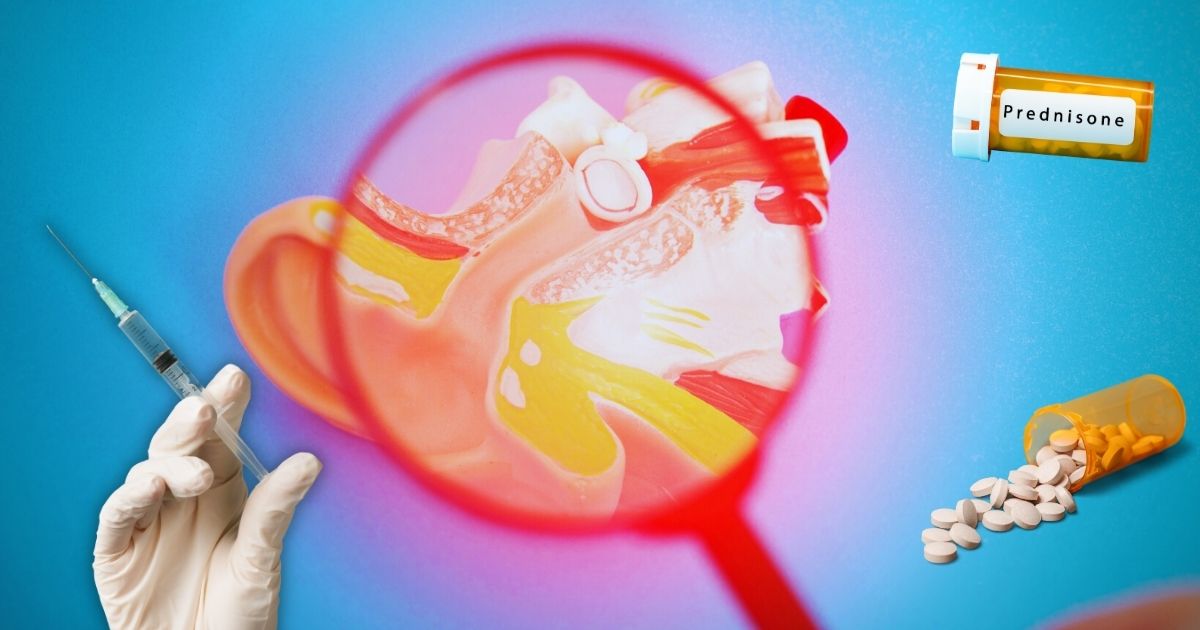Glucocorticoids such as prednisolone and dexamethasone are commonly prescribed as first-line treatment for sudden sensorineural hearing loss (SSNHL).
However, a randomized controlled trial published in NEJM Evidence suggests high-dose regimens may not improve outcomes compared to standard lower doses, while carrying greater risks of side effects.
No Significant Benefit Found for High-Dose Regimens
The multicenter trial, conducted at 39 sites across Germany, assigned over 300 patients with sudden hearing loss to receive either high-dose intravenous prednisolone, high-dose oral dexamethasone, or moderate-dose oral prednisolone over 5 days.
After 30 days, hearing threshold improvements did not significantly differ between the high-dose and standard treatment groups. Average gains ranged from 34-41 decibels across groups, with no clear advantage for more aggressive dosing.
“A higher dose of glucocorticoids did not result in better outcomes compared to the standard therapy. However, adverse events occurred more frequently. These included elevated blood sugar levels or a rise in blood pressure in patients with pre-existing high blood pressure. Despite immediate treatment with glucocorticoids, symptoms persisted in the majority of patients in all groups. Even in the group with the standard therapy, which had the best results after 30 days, 60 percent of the patients had not fully recovered.”
–Prof. Stefan Plontke, University Medicine Halle, Lead Study Author
More Adverse Events Seen with High Doses
While hearing recovery was similar across groups, rates of medication-related side effects were significantly higher in the high-dose cohorts. These included increased blood sugar, elevated blood pressure, and other expected glucocorticoid effects.
Moderate-dose oral prednisolone produced the fewest adverse events. Still, substantial hearing loss persisted for most patients after 30 days, even in the best-performing standard dose group.
Limited Evidence for Glucocorticoid Efficacy

Professor Stefan Plontke. Image credit: UMH
“Although these drugs have been used for 50 years as the worldwide standard of care for sudden hearing loss, their value in the treatment of idiopathic SSNHL remains unclear,” noted Plontke.
In fact, Plontke suggested the need for placebo-controlled trials to definitively establish whether glucocorticoids provide meaningful benefits over no treatment at all.
Given the limited gains observed in this and other studies, he argued new pharmacological options may be warranted for this condition affecting hundreds of thousands yearly.
The 1.9 million euro government-funded study is the largest controlled steroid trial ever conducted for sudden hearing loss. SSNHL occurs spontaneously and affects one or both ears, with varying degrees of severity.
Study Supported by German Government
The clinical trial was funded by a 1.9 million euro grant from the German Federal Ministry of Education and Research. Sudden sensorineural hearing loss is a global problem, affecting an estimated several hundred thousand individuals annually worldwide.
Reference:
- Plontke, S. K., Girndt, M., Meisner, C., Fischer, I., Böselt, I., Löhler, J., Ludwig-Kraus, B., +20 for HODOKORT Trial Investigators. (2023, December 26). High-Dose Glucocorticoids for the Treatment of Sudden Hearing Loss. NEJM Evid, 3(1), 1. https://doi.org/10.1056/EVIDoa2300172
Source: University Medicine Halle, NEJM






